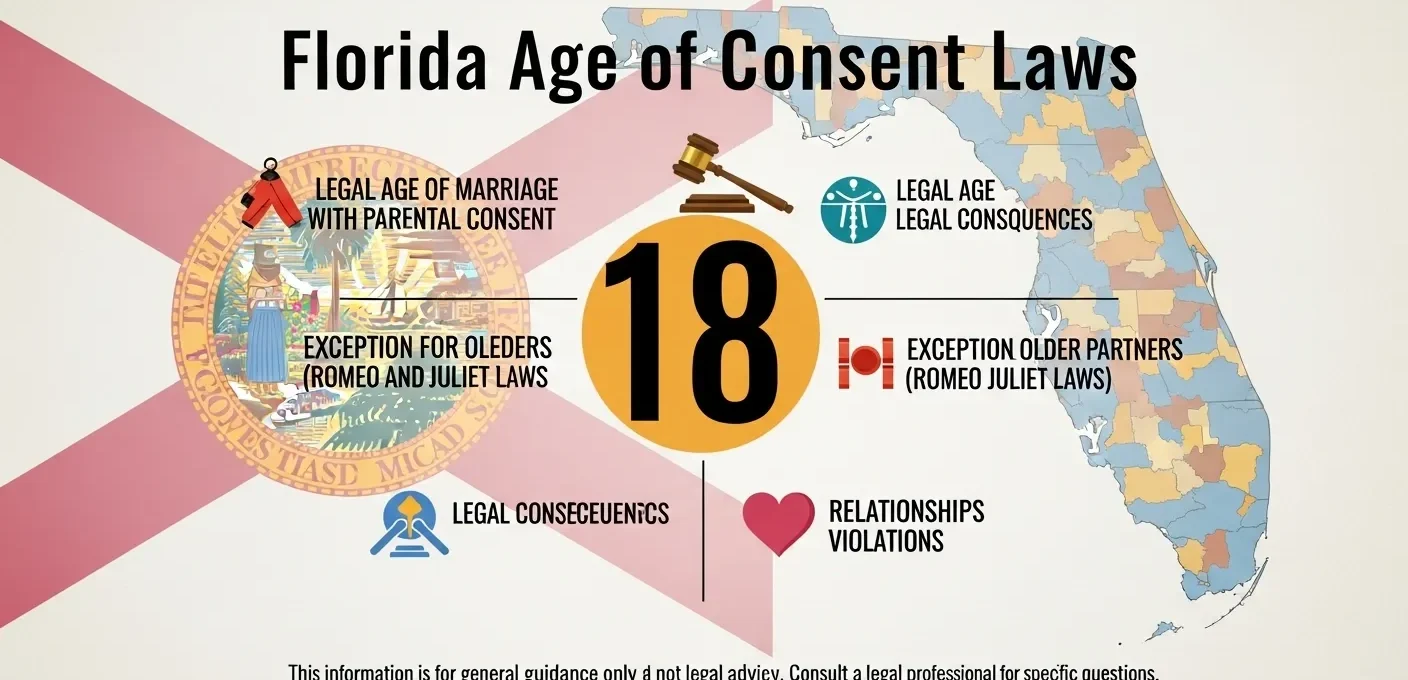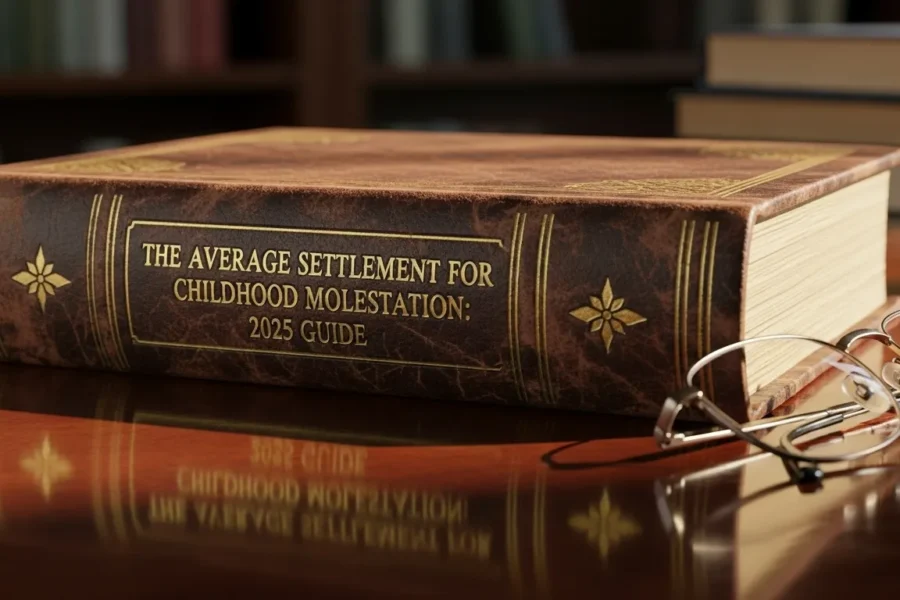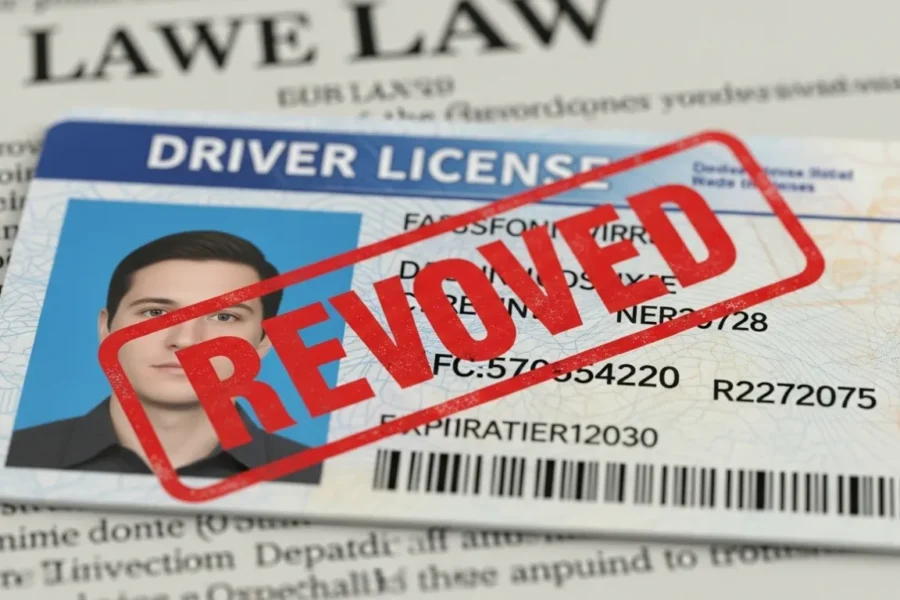Table of Contents
When we talk about age of consent laws florida, we’re really diving into rules that can affect people’s lives in serious ways. I know many teens, parents, and even teachers search for clear answers, but the information often feels complicated. So, let’s break it down in simple terms while still covering the key details you need to know in 2025.
Why These Laws Matter
We often hear the phrase “age of consent,” but what does it actually mean? These laws exist to protect minors from being pressured or taken advantage of before they’re mature enough to make informed decisions about sexual activity. They matter because the consequences aren’t just emotional they include prison time, criminal records, and lifelong sex offender registration.
What Is the Age of Consent in Florida?
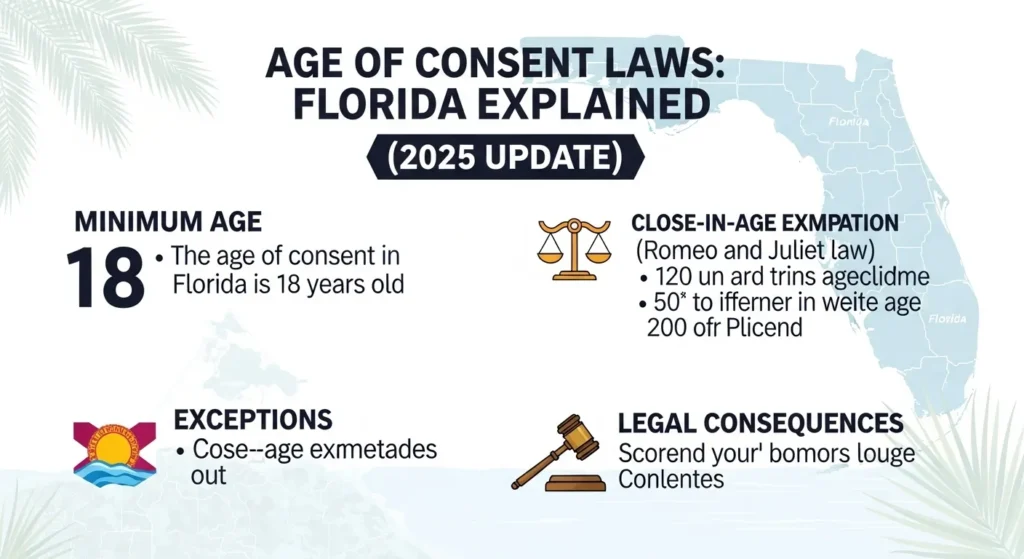
We need to start with the basics. In Florida, the general age of consent is 18 years old. That means a person who is 18 or older can legally agree to sexual activity. But the law also has different rules depending on the ages of the people involved.
Under-16 Rules (Strict Prohibition)
- Anyone under 16 is completely off-limits.
- Even if the younger person says “yes,” it’s still considered statutory rape under Florida Statute §794.05.
- Violating this rule can mean a second-degree felony and up to 15 years in prison.
16–17 Year Olds and Age-Gap Limits
- Teens who are 16 or 17 can legally engage in sexual activity, but there’s a catch.
- The older partner must be under 24 years old.
- If the older partner is 24 or older, it becomes a felony.
This rule tries to balance protecting minors while recognizing that some close-in-age relationships are normal.
Romeo and Juliet Law (Florida)
We hear a lot about the “Romeo and Juliet” law, but what does it really mean?
Who Qualifies
- It applies when the relationship is consensual and the age difference is four years or less.
- The younger person must be at least 14 years old.
- The older partner must be under 24 at the time.
Petitioning for Registry Removal
- If someone ends up on the sex offender registry due to a close-in-age relationship, they may file a petition.
- To qualify, the act must have been consensual, and the victim must have been between 13 and 17 years old.
- Over 250 successful petitions have been granted since the law’s creation in 2007.
Strict Liability and Defenses (What You Need to Know)
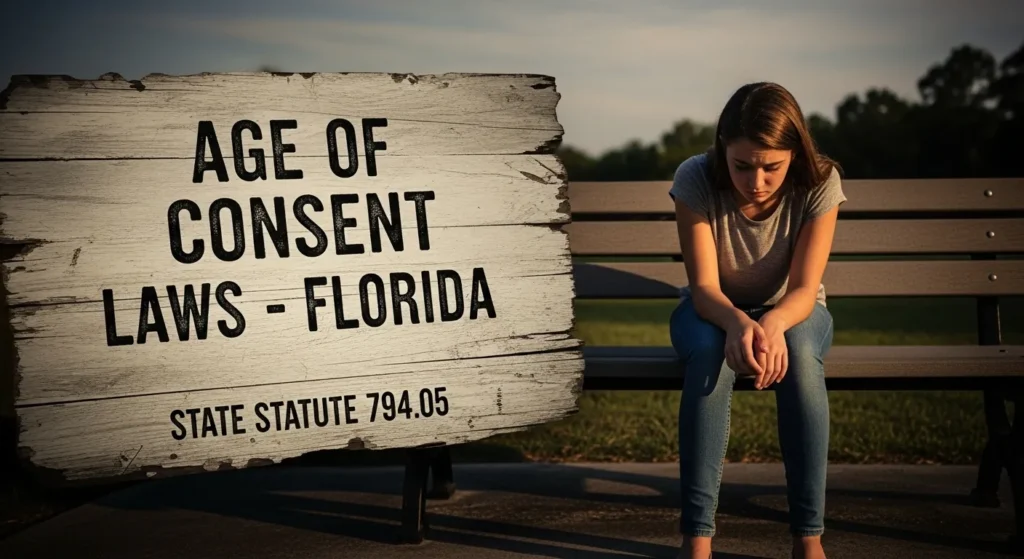
They call these cases “strict liability crimes.” That means it doesn’t matter if:
- You didn’t know their real age.
- The minor lied about their age.
- You thought parental consent made it okay.
None of these are valid defenses. Florida law is very clear: if the person is underage, the older partner is responsible period.
Related Crimes and Penalties
Lewd or Lascivious Acts (§800.04)
These laws cover more than just intercourse. Lewd or lascivious acts include touching, molestation, or even exposing oneself in front of a minor under 16. Convictions require sex offender registration.
Sexting and Child Pornography Risks
We see teens often get in trouble with sexting. Even if two minors exchange photos, they can face charges related to child pornography. For adults, it’s even more serious felony charges and possible prison sentences.
Contributing to the Delinquency of a Minor
If someone 21 or older impregnates a minor under 16, it’s a third-degree felony with up to 5 years in prison.
Sex Offender Registration in Florida
Requirements and Reporting Deadlines
Registered offenders must:
- Update personal info like address or employment within 48 hours.
- Provide notice of registry removal petitions 21 days in advance to authorities.
Residency and Employment Restrictions
- Registered offenders can’t live near schools, parks, or playgrounds.
- Job opportunities are restricted, often excluding positions involving children or public trust.
Statutes of Limitations and Case Timing
Florida law gives prosecutors extended timeframes. For many crimes involving minors:
- If reported within 72 hours, prosecution can begin at any time.
- In other cases, the statute may not even start until the victim turns 18.
This means charges can be filed years later.
Historical Context (How the Law Evolved)
Back in the 1890s, Florida’s age of consent was shockingly low—just 10 years old. Over the decades, lawmakers raised the age as society recognized the need to better protect minors. The Romeo and Juliet law of 2007 showed an effort to address unfair consequences for close-in-age couples.
Consent vs. Legal Capacity (Key Distinction)
We need to separate two ideas:
- Consent: when someone says “yes.”
- Legal capacity: whether the law recognizes that “yes” as valid.
Teens may feel they’re ready, but Florida law says minors lack the legal capacity to give informed consent in many situations.
Mandatory Reporting (Schools & Medical Settings)
Teachers, doctors, nurses, and even social workers are mandatory reporters. If they suspect or learn about sexual activity involving a minor, they are legally required to notify authorities.
Teen Relationships: What the Law Allows (and Doesn’t)
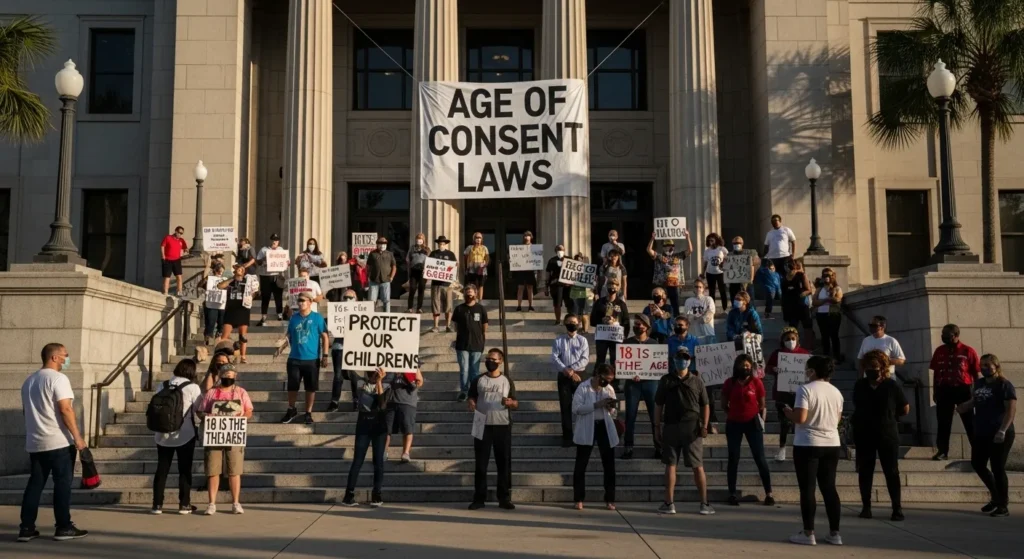
Teens often want clarity. Here’s a quick guide:
- Two 16–17-year-olds can legally date and be intimate.
- A 19-year-old and a 16-year-old can also be legal.
- A 25-year-old and a 17-year-old? Illegal and a felony.
These rules often frustrate teens, but they are designed to prevent exploitation.
Get Legal Help
We strongly recommend speaking with an experienced attorney if you or someone you know faces charges. Defense lawyers with over 20 years of experience (like Meltzer & Bell, P.A.) stress that early representation is critical to building a defense strategy.
Final Thoughts
We’ve seen how Florida’s age of consent laws combine strict rules with narrow exceptions. They protect minors but can also create tough situations for teens in consensual relationships. Remember: the general age is 18, under-16 is always off-limits, and close-in-age exceptions exist but are limited.
If you’re unsure where you or someone else stands, don’t guess—get legal advice. Laws are written to protect, but misunderstanding them can have life-changing consequences.
FAQs
What is the age of consent in Florida?
It’s 18 years old, but exceptions apply for 16–17-year-olds if the older partner is under 24.
How does the Romeo and Juliet law work?
It lets people petition to be removed from the sex offender registry if the relationship was consensual, close in age, and involved a victim aged 13–17.
Can “I didn’t know their age” be a defense?
No. Florida law rejects ignorance, mistaken belief, or parental consent as defenses.
What are the penalties for violations?
They range from felonies with up to 15 years in prison to lifelong sex offender registration.
References
- Florida Statutes §794.05 – Unlawful sexual activity with certain minors
- Florida Statutes §800.04 – Lewd or lascivious offenses committed upon or in the presence of persons less than 16 years of age
- Florida Statutes §794.021 – Ignorance or belief as to victim’s age not a defense
- Florida Department of Law Enforcement – Sex Offender and Predator Registry Requirements
- Meltzer & Bell, P.A. – Sex Crimes Defense, Florida
- Legislative History – Romeo and Juliet Law (Florida, 2007)
- U.S. Department of Justice, Office of Sex Offender Sentencing, Monitoring, Apprehending, Registering, and Tracking (SMART) – State Sex Offender Registry Laws
- “Surviving R. Kelly” Documentary (2019) – Lifetime Network
- Florida Statutes of Limitations Overview – Florida Legislature Online
Disclaimer: This article is for informational purposes only and does not provide legal advice. Florida’s age of consent laws are complex. If you face related charges or concerns, consult a licensed attorney for guidance on your specific situation.
Author’s Note – Liam Everett
As a legal analyst with a focus on criminal and family law, I’ve spent years studying how consent laws shape real lives. My goal is to simplify Florida’s complex age of consent rules so teens, parents, and educators can understand their rights and responsibilities.

